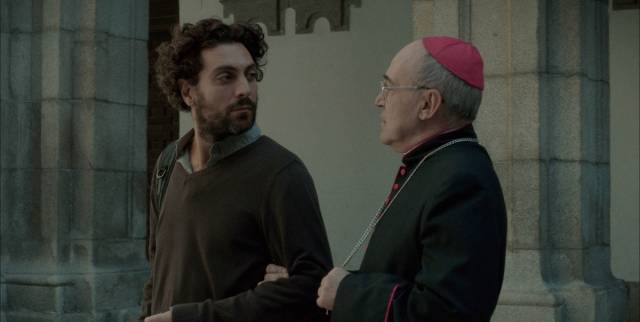
 Gonzalo (Alvaro Ogalla) is ready to quit the church, but the church isn’t quite ready to let go of him yet. That is the premise of Federico Veiroj’s incisively hilarious The Apostate, which details the complex, confusing process of officially renouncing the Catholic faith. Gonzalo is fast approaching middle age and seems to have no purpose, he is still in school but gets into philosophical discussions,in Latin, with his professors which means he is holding onto the idealism most people lose in their early 20s. He has no serious relationship to speak of, other than a tryst every now and then with his cousin (Marta Larraide) whom he chides for being in an abusive relationship with another man. The closest Gonzalo has to real structure is in his relationship with his neighbor, a precious tween named Antonio (Kaiet Rodriguez) whom he gives private lessons to.
Gonzalo (Alvaro Ogalla) is ready to quit the church, but the church isn’t quite ready to let go of him yet. That is the premise of Federico Veiroj’s incisively hilarious The Apostate, which details the complex, confusing process of officially renouncing the Catholic faith. Gonzalo is fast approaching middle age and seems to have no purpose, he is still in school but gets into philosophical discussions,in Latin, with his professors which means he is holding onto the idealism most people lose in their early 20s. He has no serious relationship to speak of, other than a tryst every now and then with his cousin (Marta Larraide) whom he chides for being in an abusive relationship with another man. The closest Gonzalo has to real structure is in his relationship with his neighbor, a precious tween named Antonio (Kaiet Rodriguez) whom he gives private lessons to.
Perhaps it’s this lack of meaning that leads Gonzalo to find something that will reassure him of his maturity, which is why he decides he’s had enough of being used as a statistic in the Catholic census. In the awkward scene in which we first discover his purpose, Gonzalo sits in the church where he was baptized, and after asking the priest to find the entry for his baptism in an enormous book that wouldn’t feel out of place in Hogwarts, he declares that he wants to be removed from the holy records. We then follow him from parish to parish as he must follow the extensive protocol necessary for his official leave.
Veiroj shoots this with a loving eye for the absurdity of it all, scenes in which we see nuns diligently get work done in computers are positively Fellini-esque, despite being completely based in reality. This is precisely what makes The Apostate such a compelling work, as we see a man who has lost his desire for more, the film invites us to open our eyes and see bits of the world we might have been too busy to notice otherwise. In spite of Gonzalo’s droll existence, Veiroj can’t help but find something divine in all his characters and scenes.
A moment in which Gonzalo sees himself as the, literal, outcast out of the Garden of Eden carries with it the shame we felt when we fell asleep in class, or were outed as having a first crush on someone. The experiences Veiroj chronicles might be rooted in the religious, but are pretty universal in their scope. For a film that could’ve easily patted itself in the back for pointing out the irony of this godless man needing divine intervention more than anyone else, The Apostate instead lovingly praises free will, it remains quite agnostic too, which, no pun intended feels rather miraculous.